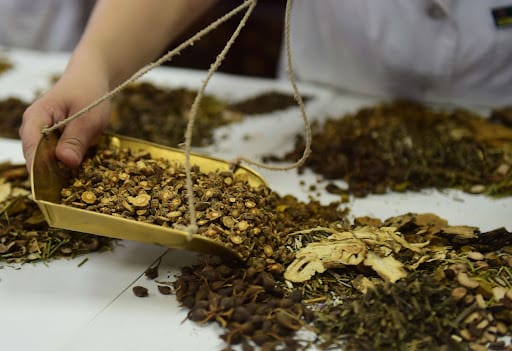- EARTH TO AILMENT
- Posts
- Earth To Ailment #62
Earth To Ailment #62

Pelargonium sidoides, an indigenous plant from the Eastern Cape, is capturing global attention as a powerful antiviral remedy. This remarkable plant, known locally as kalwerbossie or umckaloabo, has roots in traditional healing practices, further validated by modern research.
Its journey to recognition began in 1897, when Major Charles Stevens recovered from tuberculosis thanks to a treatment with this plant's root. Extensive scientific studies confirm Pelargonium's effectiveness against respiratory viruses like influenza, significantly reducing symptom duration and helping patients recover faster.
With products featuring this powerful extract now available in pharmacies, self-care takes center stage, empowering individuals to manage their health proactively. As Nicola Brink emphasizes, this shift is essential for relieving pressure on healthcare systems.
Pelargonium stands as a testament to the synergy of traditional wisdom and modern science, inspiring all of us to embrace natural remedies for healthier lives.

Pomegranate, often celebrated for its health benefits, may not be the ultimate solution for managing kidney stones as some claims suggest. While this vibrant fruit boasts antioxidants that can support kidney health, its effectiveness in eliminating stones is limited.
Kidney stones vary in size, chemical composition, and location, requiring professional medical guidance for proper management. Pomegranate can be part of a balanced diet that promotes kidney wellness, but it should not replace evidence-based treatments.
As we navigate health challenges, let us remember the importance of consulting healthcare professionals for tailored advice. Incorporating fruits like pomegranate can certainly enhance our nutrition, foster well-being, and encourage us to take proactive steps toward our health goals.

Kenya is taking a bold step forward in the realm of health and wellness with a proposed bill aimed at regulating traditional medicine. The Kenya Medical Research Institute Bill 2025, spearheaded by MP James Nyikal, envisions the establishment of a dedicated institute that will ensure traditional remedies meet rigorous quality, safety, and efficacy standards.
This initiative not only promises to professionalize an unregulated sector but also aims to conserve medicinal plant biodiversity for future generations. By empowering traditional medicine through research and sustainable practices, Kenya is embracing its rich heritage while paving the way for innovative health solutions.
This transformative journey serves as a reminder of the power of blending tradition with modern science, highlighting the importance of preserving cultural wisdom while advancing towards a healthier future for all. Together, we can champion a holistic approach to health that honors our roots and inspires progress.

Recent research highlights the remarkable potential of black cumin seed oil (Nigella sativa) as a natural remedy for arthritis pain relief. A clinical study involving participants aged 50 to 70 with knee osteoarthritis demonstrated a significant reduction in pain—over 33%—and enhanced joint mobility after using this ancient oil over just a month.
Traditionally celebrated for its medicinal properties, black cumin is a powerhouse packed with healthful compounds like thymoquinone, known for its anti-inflammatory effects. As many struggle with the side effects of conventional painkillers, black cumin offers a reassuring alternative that aligns with the growing preference for natural remedies.
This time-honored seed could light the way toward renewed movement and vitality for those battling arthritis, proving that wisdom from the past can inspire hope for modern health challenges.

Urinary incontinence can be a challenging and often embarrassing issue, particularly for women over 65. However, there is hope and empowerment through simple, natural treatments you can start at home! From enhancing your fiber intake to practicing mindfulness and Kegel exercises, these strategies can significantly improve bladder control.
Additionally, integrating yoga and staying hydrated can strengthen pelvic muscles and soothe your bladder. Remember, urinary incontinence doesn’t have to be your norm; it’s important to seek professional advice and explore various treatment options.
Embrace the possibility of reclaiming your confidence and comfort. With the right mindset and a proactive approach, you can overcome this obstacle and lead a fulfilling, active life without the fear of sudden leaks.
You are not alone on this journey, and there are effective solutions available.

The Hinoki oil market is poised for remarkable growth, projected to leap from USD 154.7 million in 2024 to a stunning USD 311.
1 million by 2031, driven by a strong compound annual growth rate (CAGR) of 10.5%.
This surge is fueled by an increasing consumer shift toward natural and organic wellness products, with Hinoki oil's calming and therapeutic properties taking center stage in aromatherapy and personal care. Rooted in Japan’s rich tradition, Hinoki oil is gaining global acceptance, encouraging sustainable practices and eco-friendly choices.
As more individuals seek effective natural remedies for stress and well-being, the opportunities for innovation and expansion are abundant. Whether in spas, cosmetics, or residential homes, the demand for this precious oil continues to rise.
The future is bright for Hinoki oil, inviting both established brands and newcomers to embrace the journey towards a healthier, more natural lifestyle.

Lung cancer is evolving beyond the stereotype of a "smoker's disease." Increasingly, it affects non-smokers, young individuals, and women, driven by factors like air pollution, genetics, and chemical exposure.
This shift challenges outdated beliefs and highlights the urgent need for awareness. Early diagnosis is crucial, as lung cancer can silently progress without symptoms.
But there's hope: advances in medical treatments, including targeted therapies and immunotherapy, pave the way for improved outcomes, allowing many to lead longer, healthier lives. It’s vital to recognize the signs—persistent cough, chest pain, or unexplained fatigue—and seek medical advice, particularly in polluted areas.
Together, we can dismantle the myths around lung cancer, empowering everyone with the knowledge that this disease can impact anyone, regardless of age or lifestyle. Let's embrace awareness and proactive health measures, transforming the narrative of lung cancer and inspiring hope for a brighter future.